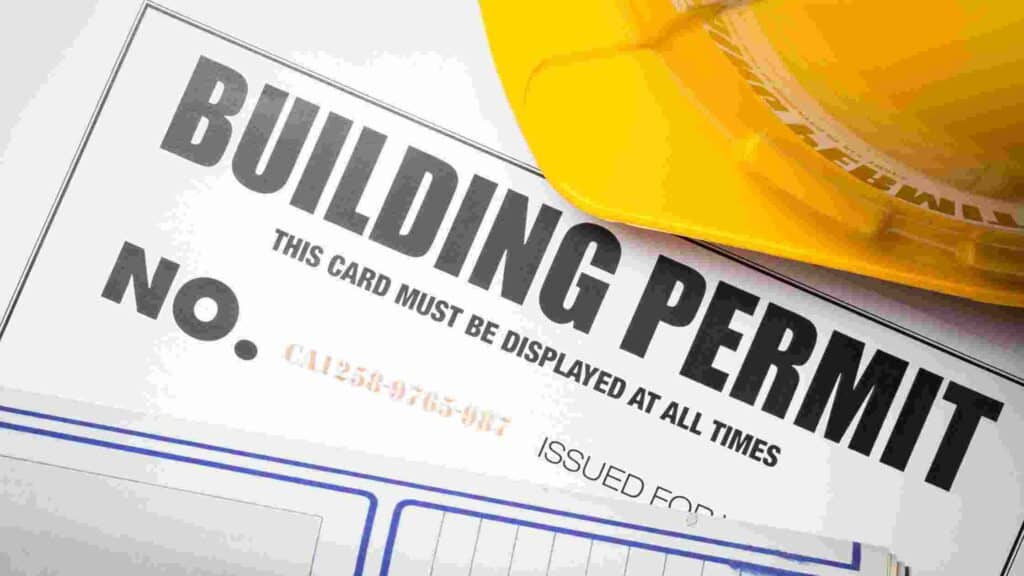Building a deck can be an exciting project, but before you jump in, let’s talk about permits. Do you need a permit to build a deck?
Yes, we know, dealing with red tape can be a headache, but it’s an important step to ensure your deck is safe and meets all the necessary regulations.
Why Do You Need A Permit To Build A Deck?
So, let’s get to the nitty-gritty. The building permit is like the green light that authorizes you to work on your deck. It’s the law and no matter how small the construction project, most places require homeowners to get a permit.
And remember, any changes to your approved plans need re-approval, so make sure you’re happy with your deck design before applying.
What Size Deck Can I Build Without A Permit?
If your deck has freestanding footings, it’s 30 inches or lower in height, and covers an area under 200 square feet, then you might be off the hook for a permit.
When Do You Need A Permit For A Deck?
There are two primary building codes to consider when it comes to getting that elusive permit:
- Do you need a permit to build a freestanding deck? If your deck is not attached to anything and stands 30 inches or more above the ground, you guessed it – a permit is required.
- Do you need a permit to build an attached deck? If your deck is going to be connected to your home or any other building on your property, you’ll definitely need a permit. It’s just the way it works.
Repairing Or Adding A Roof? Better Check For Permits!
Even for repairs or adding a roof to your deck, it’s wise to check if you need a permit.
Simple deck board and railing replacements might be fine without one, but anything involving structural changes or roofs should be done with proper permits and inspections.
What Happens If You Build Without A Permit?

So, you went ahead without getting a permit, and you got caught. Here’s what you can expect:
- Fines: Get ready to dig deep into your pockets. Significant fines are on the horizon, and they could be 3 to 10 times the cost of the permit you should have obtained.
- Stop-Work Order: You’ll be given a Stop-Work Order sign right at your door, commanding an immediate halt to your project. You’ll have to sort out the permit issue before proceeding.
- Repair Costs and Delays: The inspectors will swing by to check if your work meets the codes. If they can’t see what’s behind those walls, they might ask you to undo parts of your construction. And if anything doesn’t comply with the codes, you’ll have to bear the extra time and costs for repairs. In extreme cases, you might even have to demolish the whole thing and start over.
- Pay Up For The Permit Anyway: Even after facing the fines, you’ll still have to pay for the permit you should have gotten in the first place.
- No Insurance Coverage: If someone gets seriously hurt on your unpermitted deck, your insurance company might not have your back. That’s a risk you shouldn’t take lightly.
- Tax Troubles: You might end up owing back taxes for your property – not the kind of surprise you’d want in your mailbox!
- Deck Demolition: Worst-case scenario – if your deck is a total safety hazard and doesn’t meet code requirements, you might be ordered to tear it down.
Can You Still Get Permission After The Fact?
Alright, so you slipped up, but don’t lose hope just yet. In some cases, you might still be able to obtain permission. Measure out your existing deck, draw up plans as if you were starting from scratch, and take them to the authorities.
But beware, if your deck was built eons ago, you might need to make some changes to bring it up to current building codes.
When Building A Deck, What Are The Requirements?
Okay, time to roll up our sleeves and tackle that permit application. Here’s what you’ll need to include when applying for a deck permit:
- Deck Plans: A detailed drawing of your deck, showing how it connects to your home or other structures. Don’t skimp on the details!
- Measurements: Height, length, and width of your planned deck, including beam placement.
- Joist Specifications: Let them know the proposed thickness (2×8, 2×6, etc.) and spacing. We want this deck to hold up!
- Stair Details: Tell them where your stairs will be and how wide they’ll stretch. Safety first!
- Guardrail Height: To keep everyone safe, let them know the guardrail height too.
- Materials List: Let’s not forget the materials you’ll be using.
- Footing Type: Deck blocks with posts, screw piles, or concrete piles – pick your option and let them know.
- Yard Measurements: Don’t forget to include a scaled drawing of your yard, showing those property lines.
Remember The Zoning Rules
Different places, different rules! Zoning requirements vary from state to state and county to county. Always check the local regulations and permits that apply to your deck project.
You’ll want to know about things like minimum distances from property boundaries and clearances from the septic system.
You may also be interested in finding out how to build a backyard deck.
Why It’s Worth the Effort

We know, going through the permit process might seem like a hassle, but it’s totally worth it.
Getting that deck permit ensures that your masterpiece will meet all the safety standards and codes. Plus, it gives you peace of mind that your investment and your family are protected.
So, if your deck plans align with the building codes and requirements of your city and state, you’ll be strutting around your backyard with a permit in hand. Just a heads up, there might be a fee involved, but it’s a small price to pay for a secure and top-notch deck.
Selling Your Home With No Permit?
Thinking of selling your home in the future? Well, not having a permit for your deck can come back to haunt you. Potential buyers might be hesitant, and it could even affect the sale negotiations.
FAQs
1. How much is a permit to build a deck?
The cost of a permit to build a deck varies by location and project scope.
2. What permit do you need to build a deck?
You may need a building permit to construct a deck, depending on local regulations and the deck’s size and features.
3. Can I build my own deck?
Yes, you can build your own deck, but it’s essential to comply with local building codes and obtain the necessary permits.
4. How to get a permit for a deck already built?
If the deck was built without a permit, check with your local building department to see if retroactive permits are available.
5. Do I need a permit for a deck not attached to house?
Some jurisdictions may require a permit for decks not attached to a house, so check with your local authorities.
6. Do you need a permit to replace deck railings?
In many areas, a permit is required to replace deck railings, especially if it involves structural changes.
7. Do I need a permit to replace deck boards?
A permit is not necessary for simply replacing deck boards but always check with your local building department to confirm.
8. Do you need a permit for a floating deck?
Floating decks, even if not attached to a structure, may still require permits in certain locations, so it’s best to check with local authorities.
Conclusion: Do You Need A Permit To Build A Deck?
Whether you need a permit to build a deck depends on your local building codes and regulations. It’s essential to check with your local authorities to determine if a permit is required for your specific project.
A permit is required for decks that are either attached to your home or any other building on your property or if the deck is freestanding and reaches a height of 30 inches or more.
Permits may seem like a hassle, but they’re essential. It’s all about keeping your project safe, and up to code, and avoiding those hefty fines and headaches. Happy decking!
